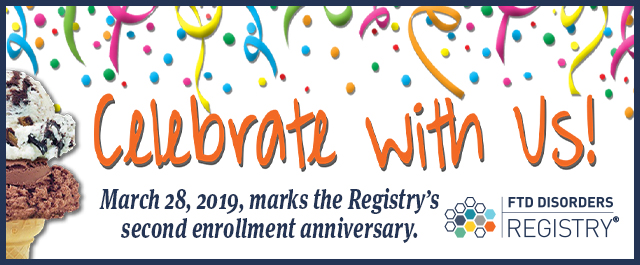PRESS & NEWS
FTDDR Celebrates 2 Years!

Guess who’s turning two? Yes, 2 years ago on March 28, 2017, the FTD Disorders Registry (FTDDR) was launched when our website went live and we began enrolling persons affected by the spectrum of FTD disorders (bvFTD, PPA, PSP, CBD and FTD-ALS). Celebrate with Us! Watch for more news and information next week as we look…
Guess who’s turning two? Yes, 2 years ago on March 28, 2017, the FTD Disorders Registry (FTDDR) was launched when our website went live and we began enrolling persons affected by the spectrum of FTD disorders (bvFTD, PPA, PSP, CBD and FTD-ALS).
Celebrate with Us! Watch for more news and information next week as we look back on where we’ve come and look forward to what more can be done.
The FTDDR is both a Contact Registry and a Research Registry.
As a Contact Registry, persons affected by FTD, their caregivers, family members, and friends can join and receive emails about FTD including research updates and study opportunities. Contact Registry enrollment is open to the U.S. and international community.
As a Research Registry, persons diagnosed, their caregivers, family members, and friends can provide their unique perspective to help us learn more about FTD. The registry collects information from participants that describe their range of experiences that result from a diagnosis of FTD. Every participant’s data is confidential, and data for research is de-identified. No identifiable information is ever shared. Note: Research Registry enrollment requires an individual to be at least 18 years of age and a resident of the U.S. or Canada (19 years in those states or provinces where the age of majority is 19; Alberta, Saskatchewan, Newfoundland and Labrador are currently excluded).
The FTD Registry supports the FTD community in several ways, including:
Celebrate with Us! Next week we will look back at the history and highlights, statistics and successes as well as the future opportunities for advancing the science and moving faster toward finding treatments and cures for persons affected by the full spectrum of FTD disorders.
We’d like to say a big THANK YOU to all who have helped advance the science so we can move faster toward finding treatments and cures!
Together we can make a difference. Together we can find treatments and a cure for FTD. #EndFTD #FTDregistry
Here is a list with links to all of the articles we posted about our Second Enrollment Anniversary:
Together we can help change the course of the disease and put an end to FTD.
Together we can find a cure for ftd
The FTD Disorders Registry is a powerful tool in the movement to create therapies and find a cure. Together we can help change the course of the disease and put an end to FTD.
Your privacy is important! We promise to protect it. We will not share your contact information.



